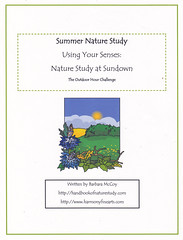Summer Series #9
Evening Primrose or Other Night Blooming Plant
Train Your Senses
- Sight: Observe an evening primrose opening. Look for night flying insects on the primrose. Observe the difference between the leaves at the base and those at the top of the plant. Look for other night blooming plants.
- Smell: In the evening, see if you can smell the sweet fragrance of a blooming evening primrose.
- Taste: See this LINK for more information. See #6 of Lesson 127 in the Handbook of Nature Study (tasting the nectar).
“Then some warm evening, usually about sunset, but varying from four o’clock in the afternoon to nine or ten in the evening, the petals begin to unfurl…..Three or four of these flowers may open on a plant the same evening and they, with their fellows on the neighboring plants, form constellations of starry bloom that invite attention, and night flying insects are often seen on them.”Read in the Handbook of Nature Study pages 488-491 (Lesson 127). There are garden species of this plant available and many areas of the United States have the evening primrose as a wildflower. Other night blooming plants include 4 o'clocks, Moonflowers, and Night Blooming Cereus.
Handbook of Nature Study, page 488

Outdoor Hour Time:
Spend fifteen minutes outdoors in the evening to observe an evening primrose. If you do not have an evening primrose, try to see if you can find any other night blooming flowers in your area. Use the suggestions from the Handbook of Nature Study to closely examine the parts of this flower, perhaps watching long enough to see the petals unfold. The Handbook of Nature Study also recommends observing a flower blossom indoors so you many wish to collect a specimen to have on hand for your follow-up activity.
Follow-Up Activities:
Make sure to discuss the reason for night blooming flowers during your follow-up activity. Have the child guess what sort of tongue the insect would need in order to gather nectar from the evening primrose. Make time for a nature journal entry using the notebook page from the Summer Series ebook or in your own blank nature journal.
Suggested Nature Journal Activities:
- Wildflowers are wonderful subjects for a watercolor drawing. Try using watercolor colored pencils to sketch an evening primrose or any wildflower into your nature journal.
- Using the notebook page and/or the coloring page included in the Summer Series ebook, record any observations your child has from their outdoor time.
- Press a blossom for your nature journal. Simple instructions can be found HERE.
- You can also use any notebook pages from the sidebar of my blog.
If you would like all the Summer Series Challenges in one place, I have an ebook gathered for you to purchase for your convenience. Here is a link to a complete description:
Summer Series of Outdoor Hour Challenges



We're planning a night blooming cereus party :)
ReplyDeleteWe have a bazillion 4-o-clocks and Angel's Trumpets, (same as Moonflower I believe), growing around our house. I'd even say they were invasive. I'm more than willing to mail free seeds.
ReplyDeletethis is our first outdoor hour challenge! we had lots of fun with it.
ReplyDeleteI literally stumbled over one today! Woo Hoo!
ReplyDeleteI walked over one today. Apparently, we do have them, but the landscapers that cut down the debris by the road clear them out. This little guy is popping back up though! http://pebblekeeper.blogspot.com/2010/09/talking-to-lord-with-eastern-sun-on-my.html
ReplyDelete